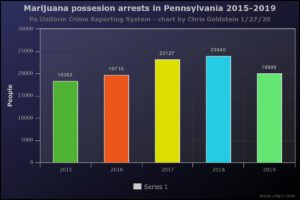Preliminary data*, released on request from the Pennsylvania State Police Uniform Crime Reporting System, reveals that overall arrests for marijuana possession showed a decline in 2019.
In 2018 there were nearly 24,000 adults arrested for less than 30 grams of cannabis. The new data shows 19,990 adults arrested for the same offense in 2019.
Chris Goldstein, a writer and regional organizer for NORML, has gathered Pa. cannabis arrest data since 2008. He called this “a significant shift.”
“Previously, there were steady annual increases in arrests for cannabis possession – thousands more every year – while other drug arrests had plateaued. Now, there is a clear downward trend in arresting marijuana consumers.”

“This is likely the result of two major policy changes: More than twenty decriminalization or penalty downgrade ordinances passed by city councils across the Commonwealth, and approximately a quarter of a million registered medical marijuana patients,” said Goldstein.
Philadelphia instituted civil fine tickets in 2014, starting a wave of municipal action to stem cannabis arrests. The largest cities followed suit such as Harrisburg, Pittsburgh, Erie and York. Most recently, in January, Norristown joined the list. Pennsylvania began offering registration for the medical cannabis program in 2017.
Lehigh Valley NORML Executive Director Jeff Riedy helped pass several ordinances, and noted that Allentown’s has yet to be implemented.
“We are clearly going to legalize marijuana and tax it here in the Keystone State, so we should stop these arrests right now,” said Reidy.
Andy Hoover, spokesperson for the ACLU of Pennsylvania, said that the data shows incremental progress but more remains to be done.
“At the very least, this means less people who are cannabis consumers are getting tied up in the criminal legal system. That’s a positive,” Hoover said. “The damage that is done when a person is arrested is significant, and it’s people of color who are disproportionately impacted, despite the fact that cannabis consumption is the same across races. Ultimately, the state legislature can stop these arrests from happening altogether by wiping marijuana possession from the commonwealth’s criminal law. For now, at least police in Pennsylvania are arresting fewer people.”
Although the data points to a promising new trend, Pennsylvania still ranks in the top five states where cannabis consumers face frequent arrest and prosecution. A recent report from Pew Research noted that Northeast states account for 53 percent of the nation’s 663,000 marijuana arrests – 9 out of 10 were for possession.

Reporting from every corner of Pennsylvania has documented the injustices happening every day:
- Police aggressively searching property, vehicles and people on the premise of marijuana.
- Those who face arrest or even summary offenses for possession are often made to undergo questionable and expensive drug treatment programs to avoid further prosecution.
- Constant THC testing sending people into an endless cycle of probation violations.
- Cannabis consumers – even registered medical patients – regularly enduring deep discrimination by property owners and employers.
NORML Chapters and policy reform groups across the commonwealth are calling for immediate action from the General Assembly, Governor Tom Wolf, and Attorney General Josh Shapiro stop police from targeting more than a million local cannabis consumers for arrest and discrimination.
“Marijuana prohibition will end in Pennsylvania. Law abiding cannabis consumers deserve better than getting arrested right until the moment we’re taxed,” said Lehigh Valley NORML’s Jeff Reidy.
* Preliminary data as released on request from the PAUCRS, these numbers may change slightly when the Annual Uniform Crime Report is published in the fall.
For more information, please contact Jeff Riedy, 610-533-0906, lehighvnorml@gmail.com or NORML Regional Organizer Chris Goldstein 609 726 6030.
Lehigh Valley NORML is a local chapter of the National Organization for the Reform of Marijuana Laws (NORML), a non-profit organization, fighting to reform cannabis laws nationwide. Their efforts include education, community outreach, and working with lawmakers.


